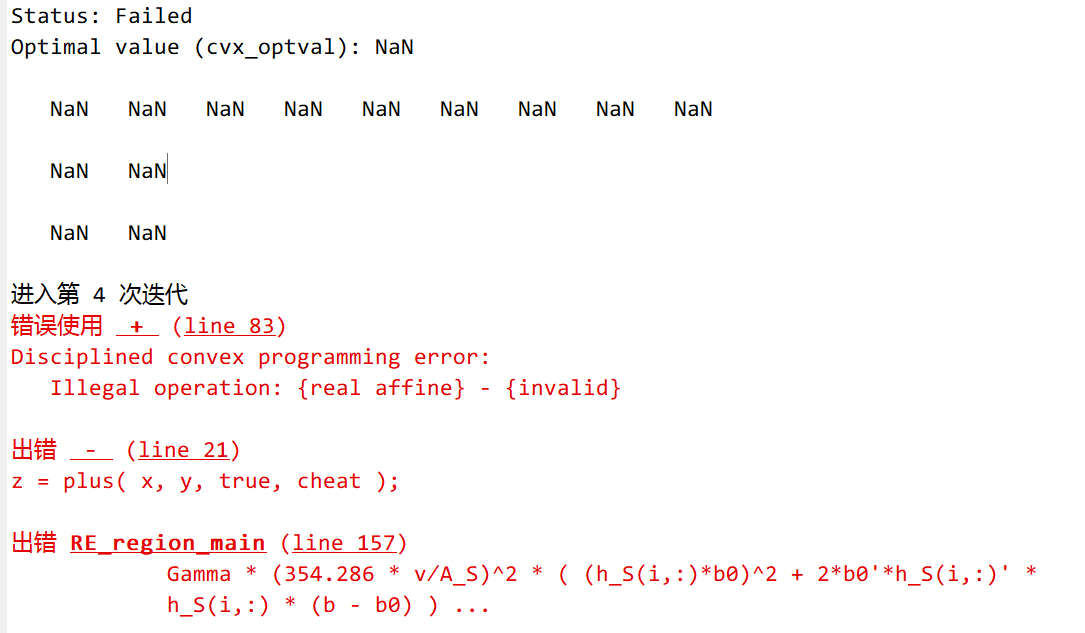Hello, a error occured when I run my code, my code is as follows, please help me. Thanks!
clc;
clear all;
A_P = 10^(-4);
A_S = 10^(-3);
half_angle = pi/3;
Psi_P = pi/3;
Psi_S = pi/3;
A = 2;
varepsilon = 1;
I_sc = 0.2;
U_oc = 5;
alpha_stc = 0.00175;
E_a = 0.4;
rho = 1;
eta = 0.75;
T_stc = 298;
E_stc = 1000;
T_a = 298;
sigma = -98.82;
xi = -log(2)/log(cos(half_angle));
T_P = 1;
T_S = 1;
N = 9;
K = 2;
LED_x = [4.9 4.9 4.9 5.0 5.0 5.0 5.1 5.1 5.1];
LED_y = [4.9 5.0 5.1 4.9 5.0 5.1 4.9 5.0 5.1];
LED_z = [3.0 3.0 3.0 3.0 3.0 3.0 3.0 3.0 3.0];
PD_x = [5.1 5.1];
PD_y = [6.0 4.0];
PD_z = [1.5 1.5];
Solar_x = [5.0 5.0];
Solar_y = [5.1 4.9];
Solar_z = [1.5 1.5];
tau = 0.9;
P_o = 30;
K_m = 683;
c_1 = 0.026;
J = 1.6;
c = 1/(J*c_1);
P_t = 53.8;
Q_t = 4.7164;
v = 1/320;
I_H = 12;
I_L = 0;
kesai = 10^(-3);
for i = 1:1:K
for j = 1:1:N
d_P(i,j) = sqrt( (LED_x(j) - PD_x(i))^2 + (LED_y(j) - PD_y(i))^2 + (LED_z(j) - PD_z(i))^2 );
phi_P(i,j) = acos( (LED_z(j) - PD_z(i)) / d_P(i,j) );
psi_P(i,j) = phi_P(i,j);
if psi_P(i,j) > Psi_P
g_P(i,j) = 0;
else
g_P(i,j) = (rho/sin(Psi_P))^2;
end
h_P(i,j) = ( A_P * (xi + 1) * cos(phi_P(i,j))^xi * cos(psi_P(i,j)) * g_P(i,j) * T_P ) / (2 * pi *d_P(i,j)^2);
end
H_P(:,:,i) = h_P(i,:)’ * h_P(i,:);
end
for i = 1:1:K
for j = 1:1:N
d_S(i,j) = sqrt( (LED_x(j) - Solar_x(i) )^2 + (LED_y(j) - Solar_y(i))^2 + (LED_z(j) - Solar_z(i))^2 );
phi_S(i,j) = acos( (LED_z(j) - Solar_z(i)) / d_S(i,j) );
psi_S(i,j) = phi_S(i,j);
if psi_S(i,j) > Psi_S
g_S(i,j) = 0;
else
g_S(i,j) = (rho/sin(Psi_S))^2;
end
h_S(i,j) = ( A_S * (xi + 1) * cos(phi_S(i,j))^xi * cos(psi_S(i,j)) * g_S(i,j) * T_S) / (2 * pi d_S(i,j)^2);
end
H_S(:,:,i) = h_S(i,:)’ * h_S(i,:);
end
Gamma = eta(I_sc+alpha_stc*(T_a-T_stc))/(c * E_stc);
I_s0 = I_sc/(exp(c * U_oc)-1);
lamda = I_sc / (E_stc * I_s0);
om = ones(N,1);
d_widehat = kron([varepsilon^(1/2),varepsilon^(1/2)]’,om);
%% kron
for i = 1:1:K
H_P_1(:,:,i) = kron(diag([5.4116,5.4116]),H_P(:,:,i));%(N * K,N * K)
G_S(:,:,i) = kron(diag([varepsilon,varepsilon]),H_S(:,:,i));%(N * K,N * K)
end
for i = 1:1:K
if i == 1
H_P_2(:,:,i) = kron(diag([0,varepsilon]),H_P(:,:,i));%(N * K,N * K)
else
H_P_2(:,:,i) = kron(diag([varepsilon,0]),H_P(:,:,i));%(N * K,N * K)
end
end
for i = 1:1:N
em = zeros(N,1);
em(i) = 1;
a_n(:,i) = kron([A,A]’ ,em);%a_n
end
b0 = [2.5 2.5 1.5 2.5 2.5 2.5 2.1 2.5 2.5]’;
x0 = [4.6 4.6]’ ;
y0 = [-18 -18]’ ;
k = 0;
while(1)
k = k + 1;
cvx_begin
cvx_solver sedumi
variable W(N * K,N * K) symmetric semidefinite; %
variable Miu(K,1) nonnegative;
variable b(N,1) nonnegative;
variable x(K,1) nonnegative;
variable y(K,1);
maximize(sum(Miu))
subject to
for i = 1:1:K
trace( W * H_P_1(:,:,i) ) - exp( x(i) + y(i) ) >= 2 * pi * 10^( sigma / 10) * 10^(-3) * ( 2^( 2 * Miu(i)) - 1 );
end
sum(b) == tau * P_o;
trace(W.*(d_widehat * d_widehat’ )) + pow_pos(norm(b,2),2) <= 10^( P_t / 10) * 10^(-3);
for i = 1:1:K
10^( Q_t / 10) * 10^(-3) - Gamma * (354.286 * v/A_S)^2 * trace(W * G_S(:,:,i)) <= ...
Gamma * (354.286 * v/A_S)^2 * ( (h_S(i,:)*b0)^2 + 2*b0'*h_S(i,:)' * h_S(i,:) * (b - b0) ) ...
+ 2*Gamma*354.286 * v/A_S*(27*v/A_S*h_S(i,:)*om + E_a)*( h_S(i,:) * b ) + Gamma*(27*v/A_S*h_S(i,:)*om+E_a)^2 ...
+ Gamma*(-rel_entr(1,lamda) - 1) * (v/A_S * (354.286*h_S(i,:)*b + 27*h_S(i,:)*om) + E_a);
end
for i = 1:1:N
trace(W * a_n(:,i) * a_n(:,i)') <= b0(i)^2 + 2 * b0(i) * ( b(i) - b0(i) );
end
for i = 1:1:N
trace(W * a_n(:,i) * a_n(:,i)') <= b0(i)^2 + 2 * b0(i) * ( b(i) - b0(i) ) - 2 * I_H * b(i) + I_H^2;
end
for i = 1:1:K
exp(x0(i)) + exp(x0(i)) * (x(i) - x0(i)) >= pi * 2^(2 * Miu(i) + 1);
end
for i = 1:1:K
exp(y0(i)) + exp(y0(i)) * (y(i) - y0(i)) >= trace(W * H_P_2(:,:,i));
end
cvx_end
mu_st(k) = sum(Miu);
if k>1
if abs( mu_st(k) - mu_st(k-1) ) / mu_st(k) <= kesai
break;
end
end
b0 = b;
for i = 1:1:K
x0(i) = log(trace(pi * 2^(2 * Miu(i) + 1)));
y0(i) = log(trace(W * H_P_2(:,:,i)));
end
end
